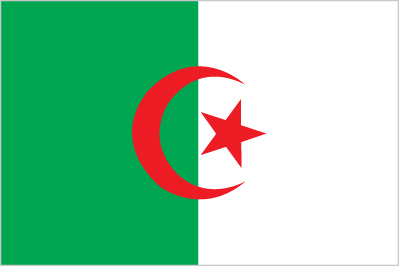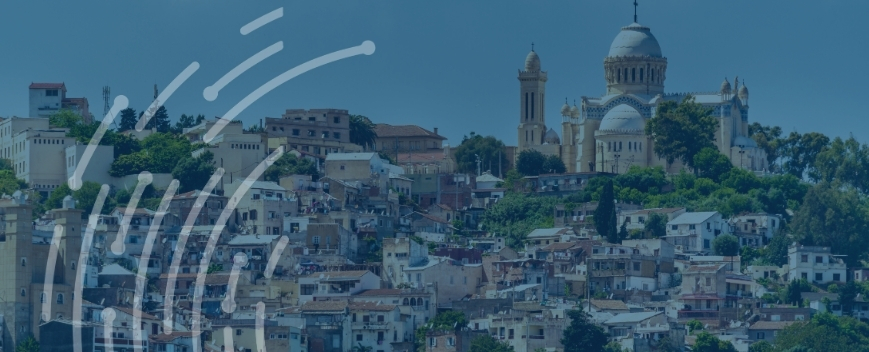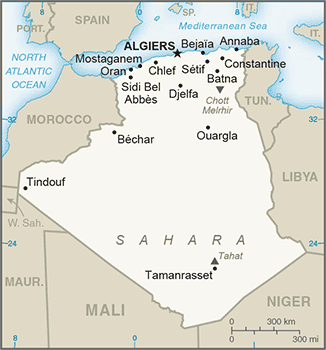Importing from Algeria


Algeria Country Profile
Official Name (Local Language) Al Jumhuriyah al Jaza’iriyah ad Dimuqratiyah ash Sha’biyah
Capital Algiers
Population 40,263,711
Currency Algerian Dinar
GDP $168.3 billion
Languages Arabic
Phone Dial In 213
Algeria Exports Profile
Exports ($m USD) 35,191
Number of Exports Products 1,115
Number of Exports Partners 127

Algeria Economic Statistics
Government Website | https://www.mae.gov.dz/ |
| Sovereign Ratings | |
| Central Bank | Banque d’Algérie |
| Currency USD Exchange Rate | 110 |
| Unemployment Rate | 9.9% |
| Population below poverty line | 23% |
| Inflation Rate | 5.9% |
| Prime Lending Rate | 4% |
| GDP | $168.3 billion |
| GDP Pro Capita (PPP) | $15,000 |
| Currency Name | Algerian Dinar |
| Currency Code | DZD |
| World Bank Classification | Upper Middle Income |
| Competitive Industrial Performance | 87/138 |
| Corruption Perceptions Index | 112/180 |
| Ease of Doing Business | 157/190 |
| Enabling Trade Index | 121/136 |
Access trade, receivables and supply chain finance
We assist companies to access trade and receivables finance through our relationships with 270+ banks, funds and alternative finance houses.
Get StartedImporting from Algeria
Algeria’s biggest export by far is oil, its most important exports being petroleum gas and crude and refined oil; it also exports some amount of nitrogenous fertilisers and metal. Algeria holds the world’s third-largest reserves of shale gas, which along with oil makes up 90% of its total exports. The industry has been expanding in recent years owing to increased demand from the European market after the start of the Ukraine war. Algeria has a substantial trade surplus which is expected to stay constant or improve in the next years, especially if the hydrocarbons sector continues to benefit from public and foreign investment.
The Algerian economy is characterised by heavy bureaucracy and vested interests, and the country consistently scores lower than its neighbours in corruption and ease of doing business reports. However, the government has been taking steps since 2020 to promote foreign investment, such as removing restrictions on foreign ownership of Algerian firms and passing laws governing credit and public-private partnerships. This, along with a focus on renewable energy investment and a growing defence market, should promote the economy and bolster it against shifts in oil and gas prices.
The Hirak protest movement that called for political reform and caused internal instability in 2019 is unlikely to return due to government crackdowns and a more optimistic economic outlook. Algeria is democratic, but elections have been criticised for lack of transparency; the ruling party and the military regulate the media and any protest movements. While there have been intermittent tensions with Morocco over the status of the Western Sahara, the political situation both externally and internally is stable and unlikely to deteriorate as long as the economy remains growing.
Chart Showing GDP Growth Compared to rest of world
Map
Top 5 Export Partners
| Country | Trade | % Partner Share |
| Italy | 5,629 | 16.00 |
| France | 4,431 | 12.59 |
| Spain | 4,103 | 11.66 |
| United States | 3,468 | 9.85 |
| Brazil | 2,128 | 6.05 |
Top 5 Exports Products
| Export Product | Number |
| Petroleum oils and oils obtained from bituminou | 40% |
| Natural gas in gaseous state | 36.1% |
| Petroleum oils, etc, (excl. crude); preparation | 18.3% |
| Natural gas, liquefied | 1.6% |
| Propane, liquefied | – |
Speak to our trade finance team
Local Partners
- All Topics
- Algeria Trade Resources
- Export Finance and ECA Topics
- Local Conferences



















